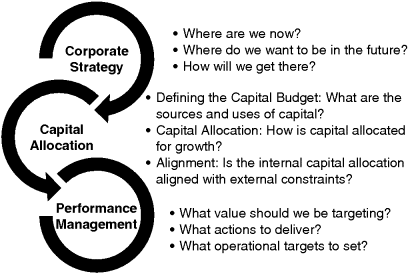Chapter 13Corporate Strategy and Capital Allocation
Corporate strategy and capital allocation determine which businesses you grow, which you harvest, which you fix or exit and where you take strategic investments to secure for future, profitable growth. These are some of the most important decisions taken at the corporate or holding company level. In the best case, wrong decisions at this level represent an opportunity cost; in the worst case, they destroy shareholder value.
Corporate Strategy, Capital Allocation and Performance Management
As Figure 13.1 illustrates, corporate strategy, capital allocation and performance management represent a continuous cycle.

Figure 13.1 Corporate strategy, capital allocation and performance management
Actions on all three levels are necessary. Developing a long-term strategic vision while the underlying business flounders is a bit like Nero playing fiddle while Rome burned: it may provide some short-term intellectual stimulation, but the priorities are misplaced. Conversely, myopically focusing on the last basis point at the expense of strategic thinking may lead to top-quartile returns for many years but runs the risk of waking up like Rumpelstiltskin to a dramatically changed, increasingly unfamiliar market.
With this in mind, value managers need to be prepared to answer the following questions regarding corporate strategy.
- What businesses ...
Get Value and Capital Management: A Handbook for the Finance and Risk Functions of Financial Institutions now with the O’Reilly learning platform.
O’Reilly members experience books, live events, courses curated by job role, and more from O’Reilly and nearly 200 top publishers.

